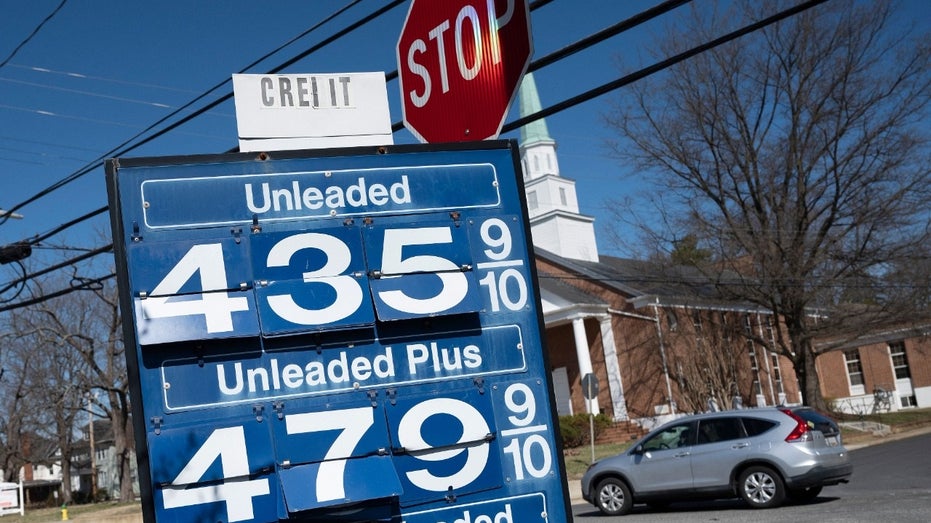Gas tax holiday in some states may be slow to reach Americans
States shouldn't assume benefits of gas tax holiday go to consumers, one expert says
Oil expert warns California will hit highest ever gasoline cost within the next 48 hours
OPIS chief oil analyst Tom Kloza discusses the impact of the Russia-Ukraine conflict on the oil and gas industry.
Several states are taking steps to temporarily pause gasoline taxes in hopes of offsetting surging prices at the pump – but the benefits may be slow to reach Americans.
Georgia and Maryland became the first states to suspend their gasoline taxes, but lawmakers in Illinois, Massachusetts, Maine, Michigan, New York, Tennessee and Virginia are considering similar proposals. There is also a push in Congress to pause the federal gasoline tax.
RUSSIA INVADES UKRAINE: LIVE UPDATES
Prices for a regular gallon of gas were $4.23 nationwide on Wednesday, according to AAA, up from $2.87 one year ago but down slightly from last week's level. One Wall Street analyst estimated that higher fuel prices could cost the average American household an extra $2,000 per year.
The sky-high gas prices have roots in the faster-than-expected economic recovery from the pandemic, which has triggered the hottest inflation in decades amid strong consumer demand, an influx of government stimulus, and disruptions in the global supply chain.
But in recent weeks, the war between Russia and Ukraine has sent global prices even higher as it impedes the world's access to energy supplies. Brent crude, the international benchmark, topped $120 a barrel on Wednesday as European Union nations considered joining the U.S. in banning Russian oil imports and as Russia-Ukraine talks appeared to yield no signs of success.
THESE STATES ROLLED BACK THEIR GASOLINE TAXES. OTHERS COULD FOLLOW
Surging prices – which come as consumers confront the highest inflation in 40 years – has prompted lawmakers across the country to look for ways to provide some relief for motorists.
Georgia Gov. Brian Kemp, a Republican, signed a bill into law on Friday that temporarily pauses the state's 29.1-cent-per-gallon gas tax until May 31. A driver putting 12 gallons into a gas tank would save $3.49 under the tax holiday. Georgia's average gas price was about $4.11 on Monday, slightly below the national average.

A car passes a gas station sign in Annapolis, Maryland, on March 14, 2022. (Jim Watson/AFP via Getty Images / Getty Images)
Maryland, meanwhile, suspended its 36-cent-per-gallon tax on Friday for one month in order to offset swollen prices. The emergency bill that Gov. Larry Hogan, a Republican, signed urges gas station owners to immediately pass along the savings at the pump. Someone filling up a 12-gallon tank would save about $4.32 under the freeze.
But there is little evidence to suggest that the fuel tax pause will give drivers a significant reprieve from rising prices.
Estimates from the Penn Wharton Budget Model, a nonpartisan group at the University of Pennsylvania's Wharton School, show that suspending the federal gas tax of 19 cents per gallon through the end of the year would result in just $50 of savings for the average driver, based on current gas prices.

A gasoline pump at a refueling station in Pittsboro, North Carolina. (AP Photo/Gerry Broome, File)
Jared Walczak, a fellow at the nonpartisan Tax Foundation, has also suggested that pausing the gas tax is an inefficient way to reduce prices at the pump.
That's in part because the motor fuel tax is an excise tax imposed on the sale of gasoline, meaning that it's paid by distributors – not directly by consumers. Because gas stations have already paid the tax on fuel they ordered before the suspension took place, it's unclear when the untaxed fuel will begin to reach pumps.
GET FOX BUSINESS ON THE GO BY CLICKING HERE
Walczak noted that Maryland drivers are "getting the full benefit of gas tax relief," while Georgia drivers are receiving less than half of it: Maryland gas prices have dropped by 37.3 cents per gallon, in line with the 36.1-cent-per-gallon tax holiday. By comparison, Georgia gas prices have declined by just 13.4 cents, despite the pause on the 29.1-cent-per-gallon tax.
"Ordinarily we would expect almost all of the gas tax to be borne by consumers, with some border effects," Walczak said. "But with fuel shortages, it's easy to imagine an equilibrium price that is higher than the tax-free price, such that the new clearing price is higher than the tax-free price."
That discrepancy could reflect things such as timing differences in one or both states, or higher price competition with neighboring jurisdictions in Maryland, he said. It may also change with time.
"But states shouldn't assume that all gas tax relief flows to drivers," Walczak said.





















